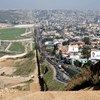territoriality
Uncovering the degree of criminal organization: Swedish street gangs and the role of mobility and co-offending networks
Social Science Research Abstract In this study we investigate organized crime by studying the degree of criminal organization. We use population-level register data on criminal suspicions between 2011 a
Anna Stilz: Climate displacement and territorial justice
Plats: Institutet för framtidsstudier, Holländargatan 13 in Stockholm, or online OBS! This seminar is part of a workshop and therefor takes place on a different weekday and time than usual. Research semi

The territory of democracy
The presumption that the jurisdiction of the state extends to the borderes of a certain territory is increasingly being challenged, both by indigenous people within this territory, and by extraterritoriral border control.
Modes of Re-Territorialisation: Spatial Implications of Regional Competition Politics in Sweden
In Sweden, efforts to develop knowledge based niches have become key elements in an increasingly growth oriented regional/industrial policy. This paper addresses the spatial implications of these chan
David Miller: Boundaries, Democracy and Territory
Professor David Miller, Nuffield College at the University of Oxford. ABSTRACT The paper I will be presenting asks the general question ‘What boundaries between political units ought there to be?’ Reje

Ulf Mörkenstam
I’m Professor in Political Science at Stockholm University. I defended my dissertation at the same university in 1999. At the institute, I participate in the research project "The territory of democrac
The Boundaries of Democracy. A Theory of Inclusion
Routledge, 166 p. This book provides a general theory of democratic inclusion for the present world. It presents an original contribution to our understanding of the democratic ideal by explaining how

Ludvig Beckman
I am Professor in Political Science at Stockholm University. In 2000 I defended my dissertation at Uppsala University. I participate in the research project "The Boundary Problem in Democratic Theory" t
Culture and tax avoidance: the case of Italy
Critical Policy Studies, volume 15 Abstract Culture is increasingly used as an explanatory variable for tax evasion. So far, we know, however, little about the mechanisms that link culture and tax behav
Rainer Bauböck: Globalization, new technologies and the future of democratic citizenship
Professor of Social and Political Theory, European University Institute. ABSTRACT Liberal democratic citizenship has been shaped by the legacies of Athens (democracy) and Rome (legal rights) but operate between individuals and states. In a Westphalian world, citizenship has both instrumental and identity value. Enhanced opportunities and interests in mobility rights strengthen instrumental interests in multiple citizenship among immigrants, among populations in less developed countries, and among wealthy elites. The latter two trends potentially undermine a genuine link norm and, if they prevail, might replace the Westphalian allocation of citizenship with a global market. New digital technologies create a second challenge to Westphalian citizenship. As has argued, digital identities could provide a global legal persona for all human beings independently of their nationality, and blockchain technologies could enable the formation of non-territorial political communities providing governance services to their members independently of states. Both the instrumental uses of citizenship for geographic mobility and technologies that create substitutes for territorial citizenship are not merely relevant as current trends. They are also advocated and defended normatively as responses to the global injustice of the birthright lottery. I will challenge this idea and argue that liberal democracies should not be conceived as voluntary associations whose membership is freely chosen, but as communities of destiny among people who have been thrown together by history and their circumstances of life. How these foundations of democratic community can be maintained in the context of rising mobility and the digital revolution remains an open question.








